https://philaholisticclinic.com/natural-treatment-for-tmj/
Treatment for TMJ is important because this condition leads to many symptoms. There are many medical conditions individuals are afflicted with these days. Some are more common illnesses whereas others may not be as prevalent as the usual ones. One such medical condition which falls somewhere in between the two rates of occurrence is Temporomandibular joint disorder or TMJ. It is important to highlight some of the general information regarding TMJ disorder such as its true definition, symptoms associated with the disorder, and possible natural remedies for curing an ailment of this type.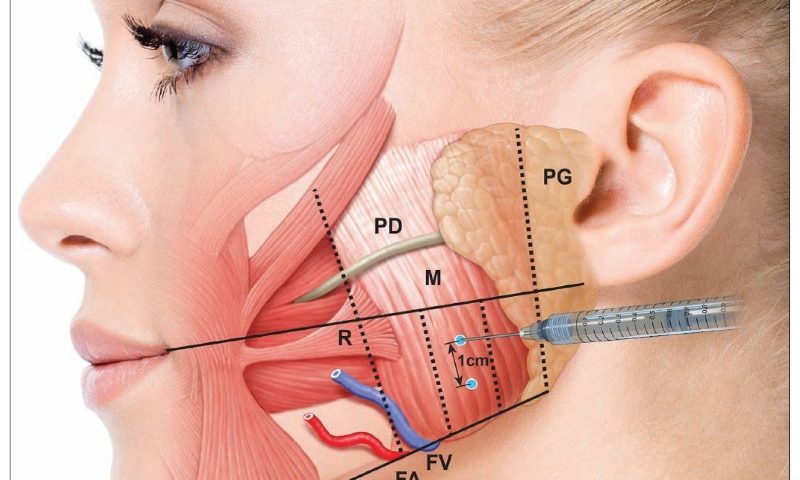
The effect of TMJ disorder causes severe pain in the jaw and face and in some instances the disorder also causes pain in the shoulder and neck. The cause of TMJ disorder requires extremely careful diagnosis and examination. Once the cause of the disorder has been established there is a myriad of TMJ treatment options available, for example, medications and injections, as well as caps and crowns, are TMJ treatment options available that help provides good temporary solutions for your pain and discomfort.
However, medications and injections do not address the real cause of the problem behind TMJ disorders and may even aggravate TMJ pain if used over a long period. Natural treatment for TMJ is often more effective as natural remedies do not cause side effects like drugs based treatments.
What is TMJ disorder?
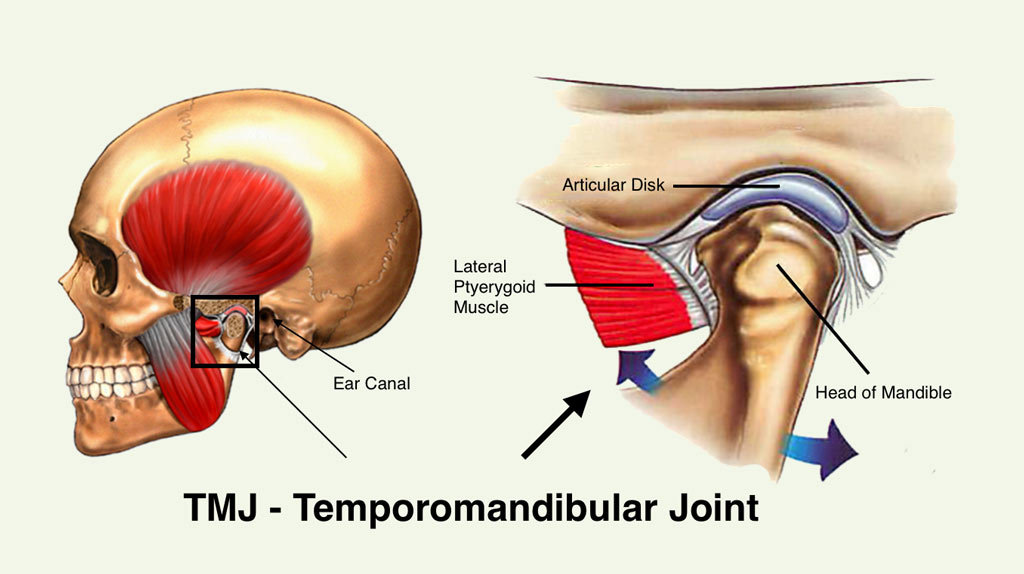
TMJ disorder can be defined as the inability of the muscles and joints in the jaw to work together accordingly to enable an individual to perform normal and necessary tasks such as chewing food. Several often-cited symptoms go along with TMJ. These may include headaches, neck pain, craniofacial pain, facial spasms, earaches, the clicking of the jaw, grinding of the jaw, and mental stress caused by the constant pain which the individual with TMJ experiences daily.
The severity and rate of occurrence of these aches and pains will differ amongst various individuals and may be signs of other medical conditions besides TMJ.
TMJ symptoms
Because many different TMJ symptoms exist, discovering a proper diagnosis is difficult. However, there are a few TMJ symptoms that involve the TM joints, ears, head, face, and teeth.
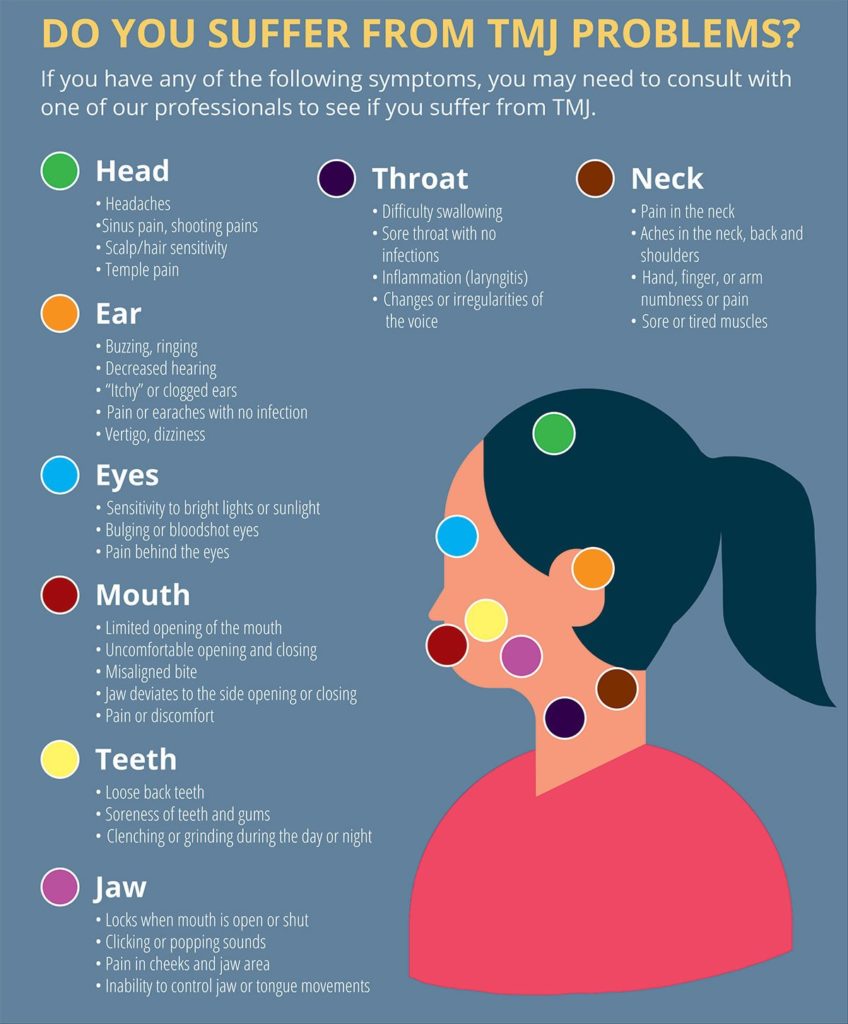
TMJ Clicking
The most common TMJ symptoms is the jaw joint clicking (popping, snapping). This clicking sound may be so loud that it can be heard by others while you chew. There may or may not be a pain in the joint itself with the sound of a click or pop. But one thing is for sure: if there is a displaced disc, as is usually the case when a click occurs, then the muscles that move the jaw while chewing are more tense than normal. This tenseness can and does cause muscle, facial, head, and neck pain.
TMJ Locking
Locking of the TMJ may be noticed simply by catching the lower jaw as it opens. Sometimes, the person with a locked joint must move the jaw to one side or another to open wide. Or, a person might have to open until he hears and feels a loud pop, at which point the jaw unlocks.
Ear Symptoms
Due to the close anatomical relationship of the TMJs to the ears, an injury to the TMJ often causes various ear symptoms. Some of the symptoms may be ear pain, fullness or stuffiness, and even a loss of hearing. That’s why so many TMJ sufferers first see their family doctor and an ear specialist before even considering seeing a dentist for a possible TMJ problem.
TMJ headache
TMJ headache is one of the most common TMJ symptoms. Usually, the TMJ headache is located in the temples, back of the head, and even the shoulders. Clenching and grinding of the teeth, both of which may be TMJ symptoms, produce muscle pain which can cause headache pain. Also, a displaced disc in the TMJ may cause pain in the joint which is often referred into the temples, forehead, or neck. These TMJ headaches are frequently so severe that they are confused and treated (with little success) for migraine headaches or abnormalities in the brain.
Sensitive Teeth
The teeth may become sensitive because of jaw activities such as clenching of the teeth or grinding of the teeth when the disc of the TMJ is displaced. Patients often see their dentist with the complaint of pain in the teeth and usually, the doctor can find no cause. Frequently (and very unfortunately), unnecessary root canals and even tooth extractions are performed in an attempt to help a suffering person. What’s worse, after these invasive and non-reversible procedures, patients still have their pain, only now it has increased!
Other Symptoms
Many other symptoms may be associated with TMJ. Often, TMJ pain will be felt in the shoulders and back due to muscle contraction, a condition called myofascial pain dysfunction syndrome. Dizziness, disorientation, and even confusion are also seen in some people who suffer from TMJ.
Depression is common with TMJ. This may be because no one believes there is a problem causing such pain and suffering. Also, plenty of scientific evidence shows that chronic pain patients (which nearly all TMJ patients can claim) have changes in chemicals in the brain (termed neurotransmitters) as a result of the pain. These chemicals can produce depression. Along with depression comes an inability to get a good night’s sleep. This may be due to TMJ pain itself or, changes in the brain’s neurotransmitter chemicals which produce stimulation even though the TMJ sufferer is asleep. Sufferers usually wake feeling like they never slept or at least, did not sleep well. This lack of sleep not only makes their pain seem worse but also adds fuel to the fire of depression.
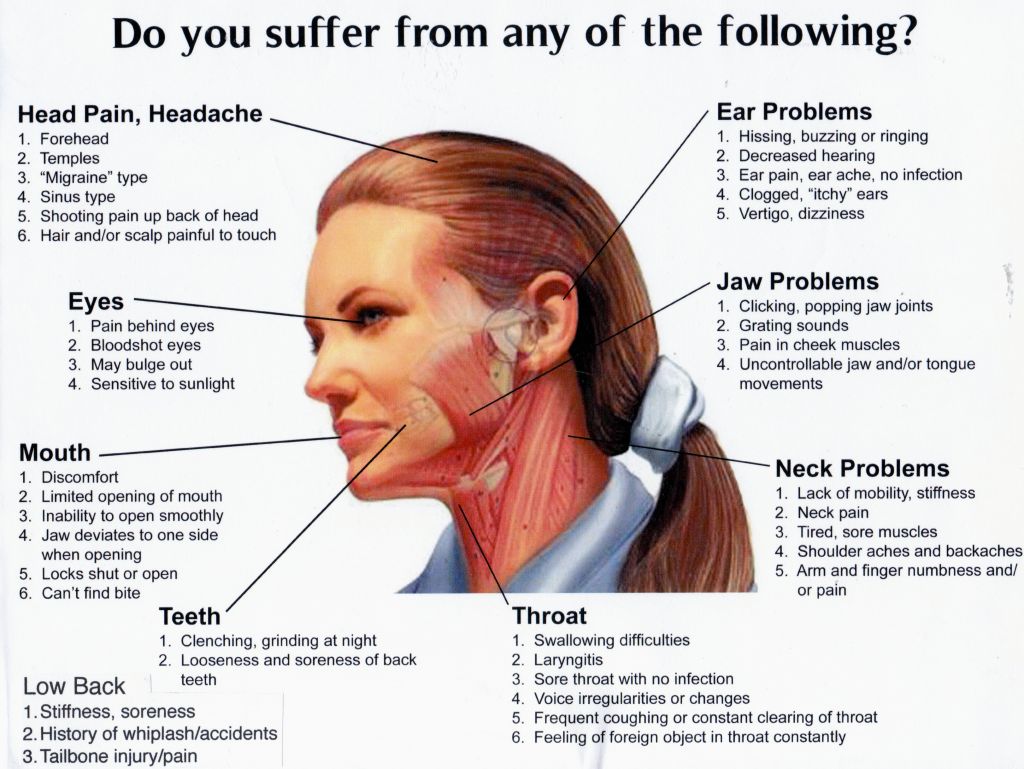
TMJ patients may also suffer from photophobia or light sensitivity. A dislocated TMJ may produce pain in and behind the eye which can cause sensitivity to light. Blurred vision and eye muscle twitching are also common in TMJ patients. A final common symptom is ringing (termed tinnitus) in the ears. This sound may be caused by many different problems (such as, working around loud noises or taking too much aspirin or ibuprofen)
Natural treatment for TMJ disorder
Natural treatment for TMJ such as acupuncture, home remedies, homeopathy, and nonsurgical alternatives such as wearing an FDA-cleared TMJ mouth guard can support the proper function of your temporomandibular joint and this natural treatment for TMJ has been proven to be effective without any side effects. The most popular is a home treatment for TMJ.
Listed below are different modalities of natural treatment for TMJ disorders
Home remedies for TMJ – most common natural treatment for TMJ
When it comes to home treatment for TMJ, there are a variety of home remedies for TMJ that can help ease TMJ symptoms, especially jaw pain and discomfort. Listed below are home remedies for TMJ
Eating soft foods like mashed potatoes and applesauce is one of the home remedies for TMJ that can help relieve jaw pain and discomfort. If you eat hard foods (such as raw carrots), cut them into small pieces or take very small bites. If you eat sticky or chewy foods – and even chewing gum – your symptoms can get worse. Limit these types of foods.
Jaw straightening and other facial exercises are natural remedies for TMJ that can help relieve symptoms of a TMJ disorder. Your doctor, dentist, or physical therapist can show you how to do jaw exercises at home to stretch the muscles in your jaw. He or she can also show you how to massage the muscles in your jaw.
Yawning and screaming are examples of extreme jaw movement that can put stress on the TMJ. Be careful not to overuse your jaw muscles, as this can put a strain on the jaw.
Applying warm or wet compresses to your jaw are home remedies for TMJ that help relax the muscles in your jaw and face. Your doctor will tell you how long to leave the ice pack or heat pack on and how the packs are properly placed.
You can wear a bite guard (also known as a stabilizing splint) to keep your teeth from grinding or clenching. Bite guards are one of the natural remedies for TMJ which is made of plastic; they fit over your upper and lower teeth and keep your teeth from touching each other.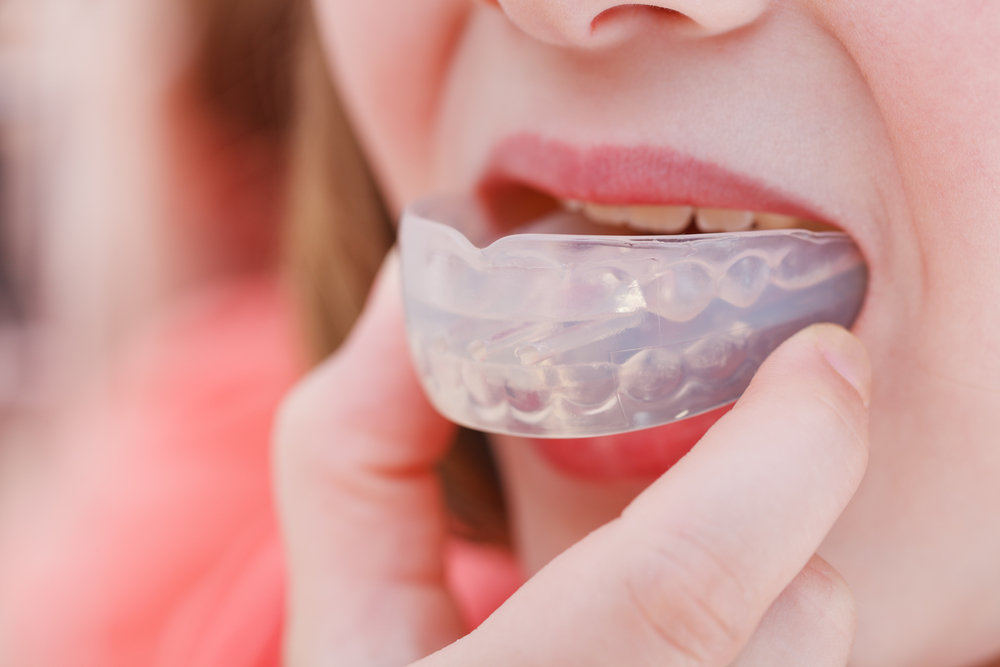
There are many types of bite guards – for example, you can wear a soft or firm bite guard. Bite guards should only be used temporarily (your doctor or dentist will tell you how long and how often to wear them). If the bite guard makes your pain worse or changes the way you bite, stop using it immediately and call your doctor.
Acupuncture for TMJ – ancient oriental natural treatment for TMJ
Acupuncture for TMJ is a natural treatment for TMJ that uses thin needles to stimulate certain nerves to signal the brain to release neural hormones.
TMJ acupuncture has been proven to reduce pain and swelling and relieve muscle spasms, which can permit the jaw to move with a wider range of motion. One study showed that 85 percent of TMJ patients responded positively to acupuncture for TMJ, reporting an average reduction of 75 percent in pain intensity.
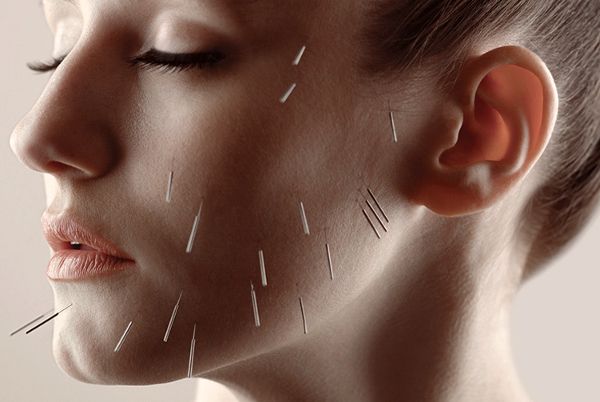
However, acupuncture for TMJ is not the treatment for you if you’re wary of needles, and you do need to see your acupuncturist regularly.
Homeopathy for TMJ – Effective and safe natural treatment for TMJ
The temporomandibular joint disorder can be effectively treated with homeopathic medicines. Homeopathy for TMJ help provides symptomatic relief in cases of the temporomandibular joint disorder in a safe, gentle manner. The suitable homeopathy for TMJ is selected individually for every case of TMJ disorder. Listed below are homeopathic remedies for TMJ
Causticum
- Causticum is a homeopathic remedy for TMJ that is well indicated for TMJ disorders when there is pain in the TMJ as well as tension and a feeling of tension in the jaw. The jaw is stiff and it becomes difficult for the person to open their mouth. Eating also becomes an uncomfortable process due to the pain and stiffness in the jaw. Causticum is also indicated in the case of a TMJ disorder of arthritic or rheumatic origin.
Rhus Tox
- Rhus Tox is a natural homeopathic remedy for TMJ. When using Rhus Tox, pain in the temporomandibular joint with severe stiffness is the hallmark. Pain in the jaw can be dull, painful, or crampy. The crackle comes mainly from the movement of the jaw. A person in need of Rhus Tox can relieve jaw pain by applying heat or applying pressure to the area. Rhus Tox also helps with TMJ diseases that have been injured in the past.
Silicea
- Silicea is a homeopathic remedy for TMJ diseases of rheumatic origin with joint pain in the jaw. In most of the cases where Silicea is required, the jaw pain tends to radiate to the temple (in the head). There may also be swelling of the jaw. There may also be annoying and tearing pain in the teeth.
Spigelia
- Spigelia is a natural treatment for TMJ made from a plant commonly known as pink root. The plant belongs to the natural order of the Loganiaceae. The main feature of using Spigelia for TMJ disease is jaw pain radiating to the ear and temple of the head. In some cases, this pain seems to spread to the neck. These pains tend to be excruciating. Facial pain and toothache may also occur with the above symptoms.
Herbs for TMJ – traditional natural treatment for TMJ
Herbs for TMJ are natural remedies for TMJ that give the body the proper nourishment it needs that could replenish the body’s deficiencies. These deficiencies lead to stagnation of the blood flow channels and pain. Using these herbs for TMJ can help promote healing from TMJ disorder. Listed below are herbs for TMJ that has been proven to be effective:
Rhus Toxicodendron:
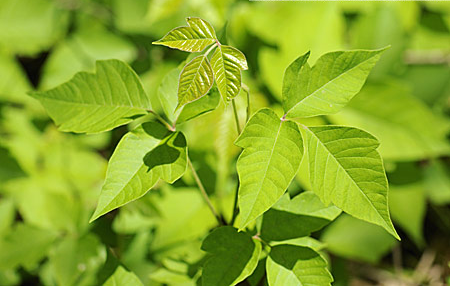
This is one of the best herbs for TMJ that can help relieve jaw stiffness.
Kava Root:

If your TMJ is due to stress or anxiety, Kava can be used to calm your nervous system and in turn, reduce TMJ symptoms caused by anxiety like a stiff jaw.
Ginger:

Ginger has been used for over 4,000 years in cooking and other medicinal uses. Traditionally, ginger has been used for nausea, pain, and inflammation. This can bring hope to individuals with TMJ disorder; because a lot of clenching causes structural damage to the joint and this leads to inflammation.
Conclusion
Natural treatment for TMJ is effective, successful, and affordable. In many cases, TMJ patients may avoid high-cost medical and surgical procedures commonly used by Oral & Maxillofacial Surgeons. The most effective treatments for TMJ are the use of home remedies for TMJ, homeopathic remedies, herbs, and acupuncture.
If you suffer from TMJ disorder contact Philadelphia Holistic Clinic (267) 284-3085 to schedule your appointment for evaluation and treatment with the Medical Doctor Victor Tsan. Dr. Tsan will examine you and propose the bests, customized for your condition, natural treatment for TMJ
Comments
Post a Comment